Sixteen-year-old Jorge Pepito had no time to weep.
A day after his father was killed, he helped prepare for the wake near their home, not far from the spot where his uncle and two others were attacked. They had been drinking when masked men, together with uniformed police, suddenly descended on their neighborhood, killing two of the men in the group, as well as Jorge's father, Marlon, who was inside his house at that time.
Jorge, the fourth of five children, could only spare a day to grieve for his father. On the second night, fearing he might lose a day's wage or even lose his job if he did not report for work, he was back at the fish port.
Jorge and his father lived together in a small shack in a slum area on Radial Road 10 or R-10 in Navotas near the fish port where they worked. Jorge grew up seeing his father earn a living as a casual stevedore, dragging buckets of fish at the port after trawlers dump them there for resale to wholesalers.
When he was just 10 years old, Jorge started working as a washer, someone who puts water on the buckets of fish when they are unloaded and prepares these buckets for the next haul. Six years later, the frail boy was promoted to be a stevedore, something he earnestly welcomed because it increased his daily wage.
Stevedores are paid by the bucket. Each worker can earn 400-500 pesos daily if they are able to haul as many as 20 buckets through the night.
At noon of January 17, his father was about to sleep inside their house. Outside, his uncle Maximo was drinking with Roel Rustia and Eddie Languido. Suddenly, Jorge heard a commotion that awakened him. Police were running after Rustia, who got cornered when he jumped from one roof to another and was shot near Jorge's father's house.
The masked men then went inside the house and assaulted Marlon. He was beside his granddaughter when he was asked if his name was Marlon. Seconds after being asked to go down to the first floor, Jorge heard gunshots and feared the shots were meant for his father.
In the tightly packed row of houses separated only by thin plywood, neighbors overheard the lead officer talking on the phone saying they got the wrong "Marlon."
Jorge's uncle, Maximo, was the third one killed that night.
Marlon's case is one of the "deaths under investigation" or DUIs in President Rodrigo Duterte's war on drugs. The war's casualty count is now around 7,000, including unsolved summary executions and deaths at the hands of police officers for allegedly "trying to resist arrest."
Most of the 7,000 victims are from the poorest neighborhoods in Metro Manila, large pockets of slum communities in Caloocan, Malabon, Navotas, Manila, Marikina, Pasay and Quezon City. The poor are the ones bearing the brunt of Duterte's resolute, almost obsessive, drive to rid the country of 3 million drug suspects, as he has often claimed in his speeches while holding or pointing to a dossier of "narco politicians" linked to drugs.
During his 2016 presidential campaign, Duterte vowed to get rid of drugs in three months. This changed to six months when he got into office, but six months hence, with many suspects still at large, he said he would have to pursue his drug war until his last day in Malacanang in mid-2022.
Although some of the drug suspects who have been arrested or killed are wealthy and powerful, the reality on the ground is that the poor are the ones affected most by the campaign. One reason for this is because barangay leaders had been tapped to come up with lists of suspects from their neighborhood. The shirtless, bare-footed and homeless-- many probably drug users, but nonetheless victims of drug syndicates who take advantage of their vulnerability--were the easy suspects and targets.
Money played a big part. Initially, drug pushers and users were encouraged to "surrender" when the killings started in July 2016. Surrenderers turned out by the thousands to have themselves listed. From this same list came arrests whenever there were "Oplan Tokhang" or "Oplan Galugad" operations where police search for and arrest drug suspects. In the process, those arrested had to fork up anywhere between P30,000 to P50,000, that is, for those who faced charges that were bailable. Those unable to come up with the money end up in decrepit city jails, or worse, mysteriously end up on the streets dead.
"Nakakalungkot e, mga Pilipino, dahil mahihirap, walang tigil kahit 7,000 na ang pinapatay," said Fr. Nonong Fajardo of Adamson University, a staunch advocate of the right to life in the Catholic community.
(It is saddening, they won't stop killing Filipinos even if the number has reached 7,000, only because they are poor.)
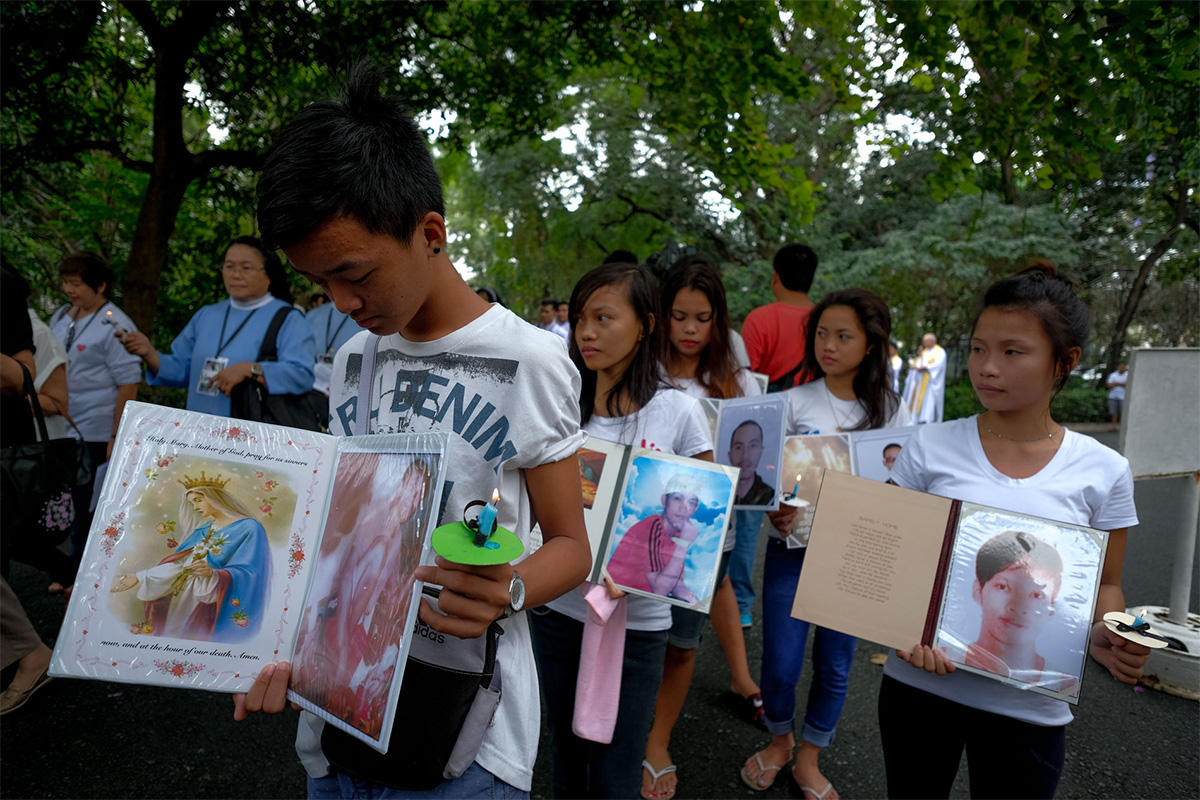
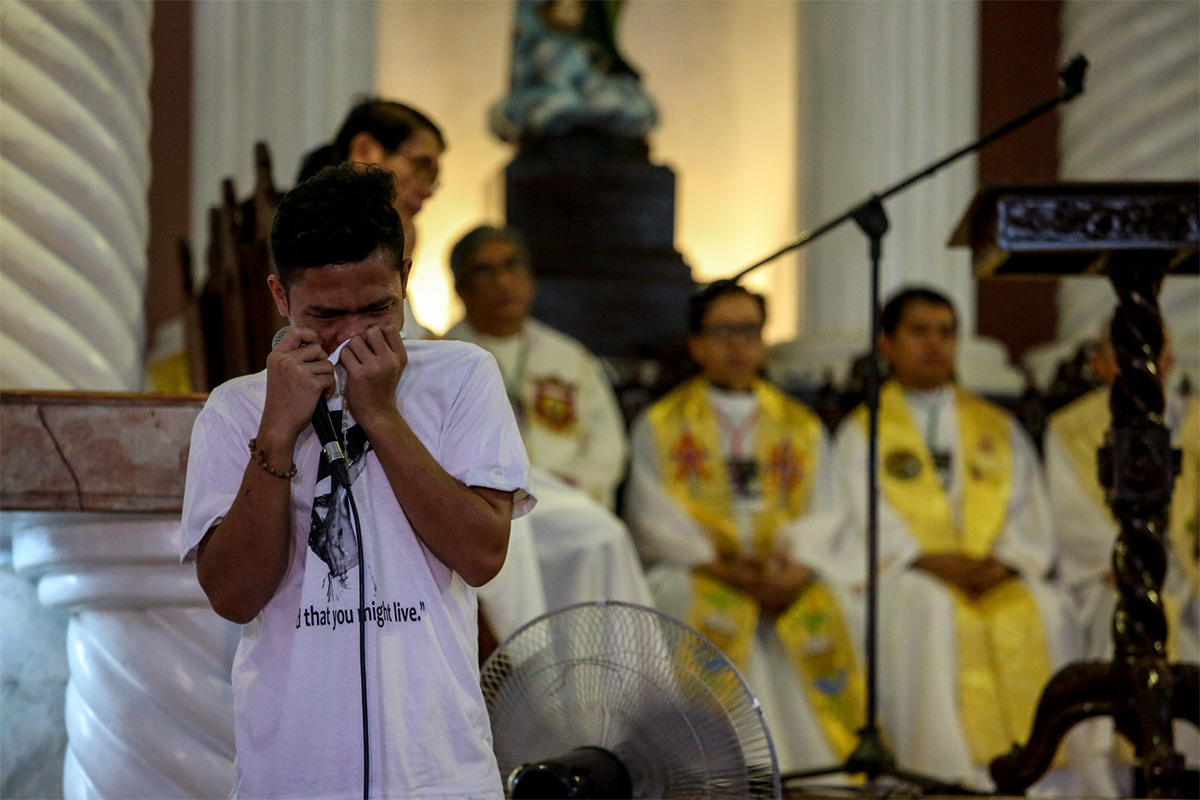
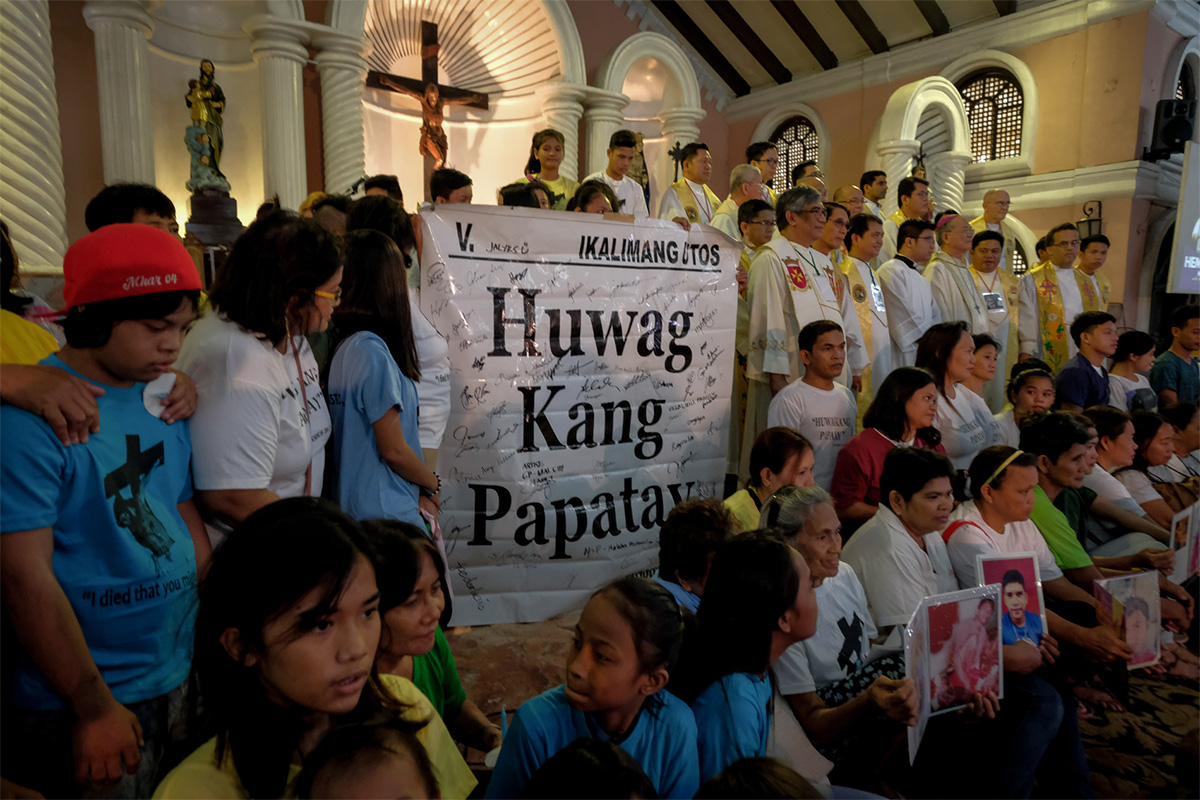
But the victims of the drug war are starting to come out in the open one by one to tell their stories.
On February 2, relatives of the victims attended the first Holy Eucharist Mass Action, a Mass dedicated to the victims of extra-judicial killings (EJKs) held at the Our Lady of Victory Chapel in Malabon. Some of the victims used the pulpit to reveal what they were going through and what they were feeling.
Rolando Paredes insisted his son, Rolando Jr., was a victim of mistaken identity. The authorities, he said, were looking for a Reynaldo Gutierrez. As proof, this was the name given by the police to the funeral parlor when they delivered Rolando Jr.'s body.
"Marami tayong kaso na ganito e, kung saan karamihan ng napapatay madudumi ang paa, naka tsinelas. ‘Yung mga matataas na drug lord ay ayaw nilang asikasuhin," Paredes said.
(There are so many cases where the unshod or people wearing only slippers are being killed. The drug lords and people in high places are left untouched.)
Money is a constant problem for the poor, and the need for it deepens once they lose someone in the war on drugs. Many of the families of victims work in the underground economy-- as food-cart vendors, cigarette retailers, tricycle drivers, junk-yard workers, port assistants and the like--jobs that pay wages below the minimum of P481 a day, or lower than the P9,140 a month poverty threshold. Some, like Jorge, earn just enough to almost make this threshold but it's not guaranteed if you are a casual worker.
Municipalities have accredited funeral services that look after the dead after police have done their work. These funeral services go to the crime scene right after the police to collect the dead.
The Eusebio Funeral Homes in Malabon is one of these accredited service providers.
"Ang rate namin talaga ay 35,000 (pesos) kasama na ang embalsamo, make-up at damit, pati na ang ataol," said Orly Fernandez, a 40-year veteran in the industry and currently the manager at Eusebio.
(Our rate is P35,000 which includes embalming, make-up and clothes, including coffin.)
He said this is the best deal for the families since it includes everything. The only thing excluded is the space for the burial. For the poor, this space is usually a slot just slightly larger than the coffin and stacked like "apartments" five to six stories high. It costs from P1,500 to P7,500 in a public cemetery and good only for five years, after which the decaying bodies are disposed of.
"Kung ayaw nila, puwede nilang kunin yung katawan pagkatapos ng embalsamo, bayad sila ng 15,000 (pesos). Mahal na ang gamit naming formalin, mas mahal pa sa gasolina ngayon," Fernandez said.
(If they don't want us just to service the body after we embalm it, they can get it for P15,000. The formalin nowadays costs a lot, even more expensive than gasoline.)
Our conversation was cut short by a telephone call from one of his clients. "18,000! Okay 16,000 pero wala ng bawas yan, puwede niyo ng kunin pagkabayad ng 16,000," he said over the phone.
(P18,000! Okay, P16,000 but that's my last price, you can pull it out once you pay P16,000.)
"Mapapamahal pa sila e, kasi babayaran din nila yung service nung ibang funeraria pati yung ataol, hindi nila alam yun," Fernandez explained, justifying his wholesale price of P35,000, take it or leave it.
(They will end up paying more because they have to pay the next funeral house for service again and pay additional for coffin and other services, that's what they don't realize.)
But, for most of these families, P35,000 is almost half a year's wage or equivalent to a poor household's budget for 6 months for food, electricity, water, transportation and education for extended families living under one roof. Coughing up P35,000 for funeral services worsens their poverty.
"Sumasama-sama siya sa tatay niya sa pangingisda. Matagal na siyang tumigil ng pagaaral e, 10 years old pa lang," said Dolores Roca of her son Jhon Dela Cruz, 16 years old, who was gunned down in front of his 15-year-old wife just outside their house.
(He used to go with his father to fish. He stopped studying long ago when he was 10 years old.)
Roca said her son had minor altercations with authorities for petty theft, and admitted he was a problematic child and used drugs like marijuana. But she wept as she recalled how he begged for his life saying "Nanay ko, nanay ko, huwag po (Help me mother, please don't)" before he was killed.
"Sana inaresto na lang nila e. Okay lang akong mabulok siya sa preso huwag lang yung ginawa nila," added Roca.
(I wish they had arrested and jailed him, I am okay with him rotting in jail but not like this.)
She lamented how they were scheduled to leave this pocket of shanties along R-10 where apparently nothing has improved in the last 20 years. Of the more than 100 families living in this corner of R-10 on BBN (Bagumbayan North) in Navotas, 30 have already been relocated to Tanza in Cavite and Pandi in Bulacan. The Roca family, including Jhon Dela Cruz, was scheduled to be relocated this March.
"Sana 'Nay makalipat na tayong Bulacan (Ma, I hope we can transfer to Bulacan soon.)," Dolores recalled her son telling her, as he was hoping their luck would change once they were relocated to Pandi.
That hope has now been extinguished. Jhon left behind a 15-year-old wife and a month-old baby, plus bills for the funeral service and interment.
With no savings and no immediate help available, Dolores had to ask around for help from relatives, friends and neighbors. The local government of Navotas, where his husband also works part-time, can provide only P5,000 assistance. Here's where gambling comes in. Gambling tables, for betting games such as "sakla" (Philippine version of tarot) and Bingo offered by syndicates to families during wakes, help defray the cost, as part of the table rentals go to the relatives of the deceased.

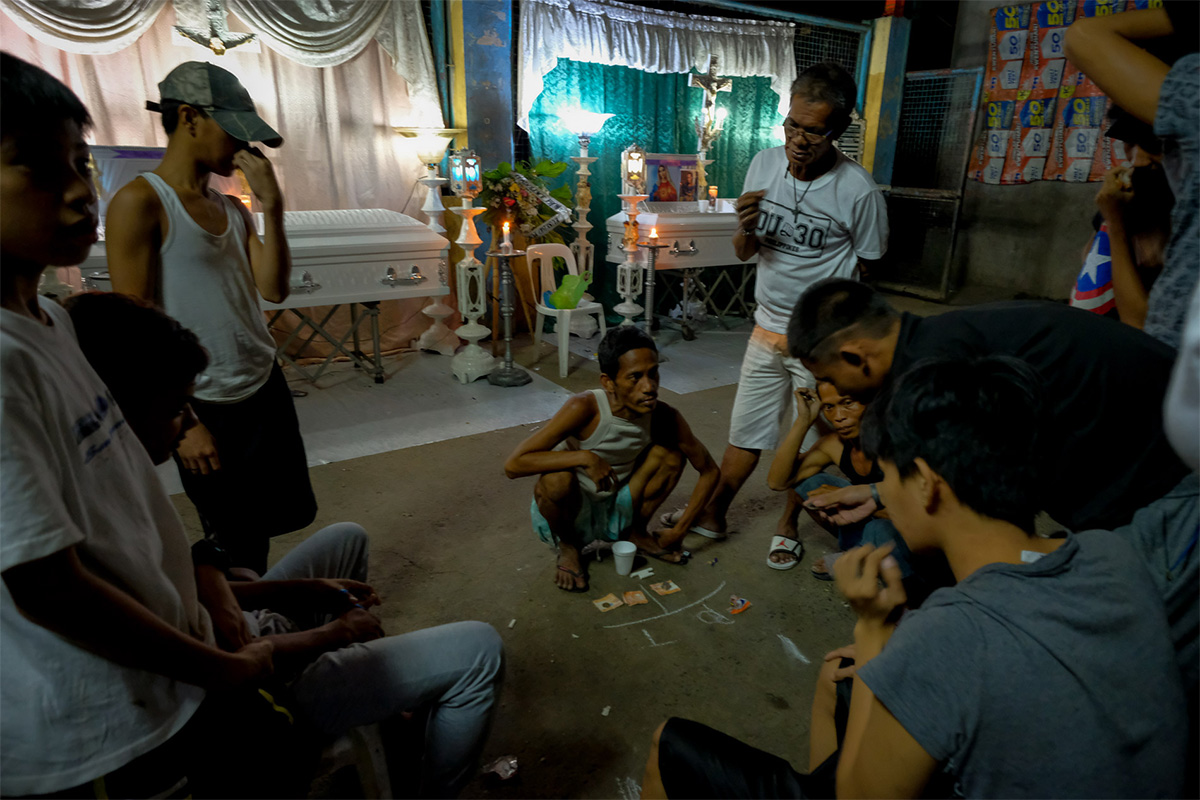
In a dialogue for the first time last January 25 between relatives of victims of the drug war and representatives of the government, the Department of Social Welfare and Development (DSWD) admitted there is a social crisis facing the families of EJKs. Although the DSWD cannot do anything about the cry for justice being sought by the relatives, because this is the "job of the police" and the judicial system, social workers assured the 30 families who came to the meeting that the agency was willing to help provide welfare assistance.
The agency gives food packs, educational assistance for college students, livelihood programs and burial assistance of P5,000, but only after going through the bureaucratic process. The financial aid is given around a month after submitting all the requirements.
But the dead cannot wait, and this gives funeral service providers the leverage to charge more.
Eusebio's Fernandez is confident the formalin they inject for embalming can last more than the guaranteed 10 days, possibly 15 days maximum. Beyond that, families will have to come up with more money to to prolong the preservation of the body, lest it rot at the wake.
The Baclaran Church has always been identified with the poor. The Redemptorists' specific mission is to help the poor, including those abandoned; hence, their various social justice programs for street children, the urban poor, migrant workers and other disadvantaged sectors.
Even before the spate of EJKs, the Redemptorists had been providing burial assistance to Pasay residents from between P4,000 to P5,000. But last November, they opened their doors to people asking for help from other parts of Metro Manila. But it's getting harder for them to help because the cost of funeral service has spiraled. Before, P7,000 to P8,000 was enough; but now, the cost of a funeral service has gone up to between P35,000 to P60,000.
"Kapag ipitin pa o lagyan ng mga maraming burukrasya ‘yung pagtulong, alam na nga natin kaya kayo pumunta kasi walang kakayanan e, kapag pumunta ng DSWD o other government agencies maga-antay pa. So, habang tumatagal ‘yung wake, mas lalong burden sa pamilya," said Dennis Febre, a social worker at Baclaran Church's Permanent Commission on Social Mission (PCSM).
(If we make it hard for families to receive help and put it under layers of bureaucracy, and we all know they are poor which is why they sought help, they still have to wait if they go to DSWD or other government agencies. The longer the wake, the more burdensome it is to the families.)
The Baclaran Church also provides grieving therapy, cash-for-work, and shelter, if needed, to those under threat of retaliation from authorities for those who have decided to speak up. They have also partnered with other church-based organizations for those needing long-term assistance.
Rise Up, a group led by church people that has networked with 10 other different organizations, was founded in November specifically for the purpose of helping relatives and victims of drug-related killings.
Nardi Sabino, convenor of Rise Up, recalled how at the start of the drug war, people in the community actually condoned the killings and were even dismayed with people helping the victims.
"Pero dahil doon sa pagdami ng patay at sa campaign, unti-unti nakikita na nila na mahalaga ‘yung buhay, unti-unti nakikita na nila na meron palang puwedeng gawin," Sabino said.
(But because the number of killings cannot be ignored anymore and the consistent campaign, people are realizing that life is valuable, people are realizing something can be done other than killing suspects.)
"Naipakita na mayroong grupo na nagbukas para sa mga kapatid natin na ligaw. Naipakita na mayroong grupo para doon sa mga biktima ng pagpaslang at may puwede silang lapitan," Sabino added.
(We have shown that there is an avenue for people who turned to drugs. We have shown that there is a group ready to help victims of extra-judicial killings.)
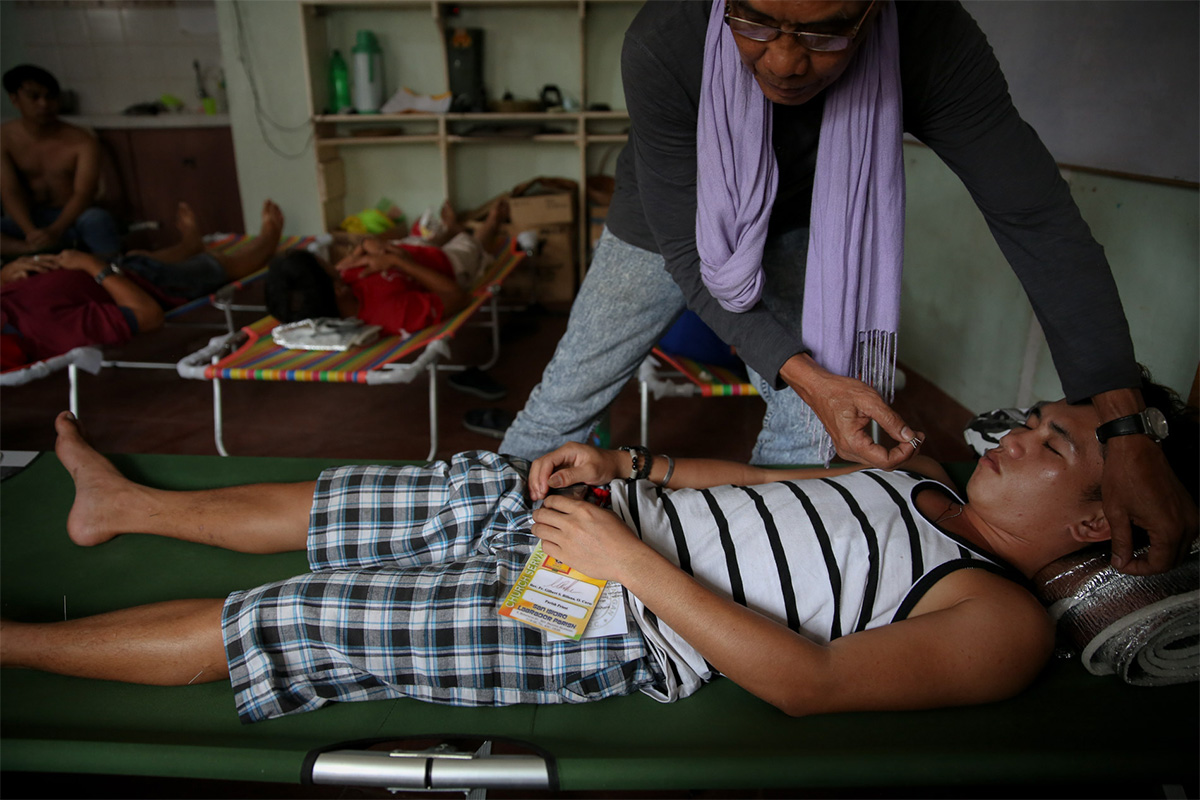
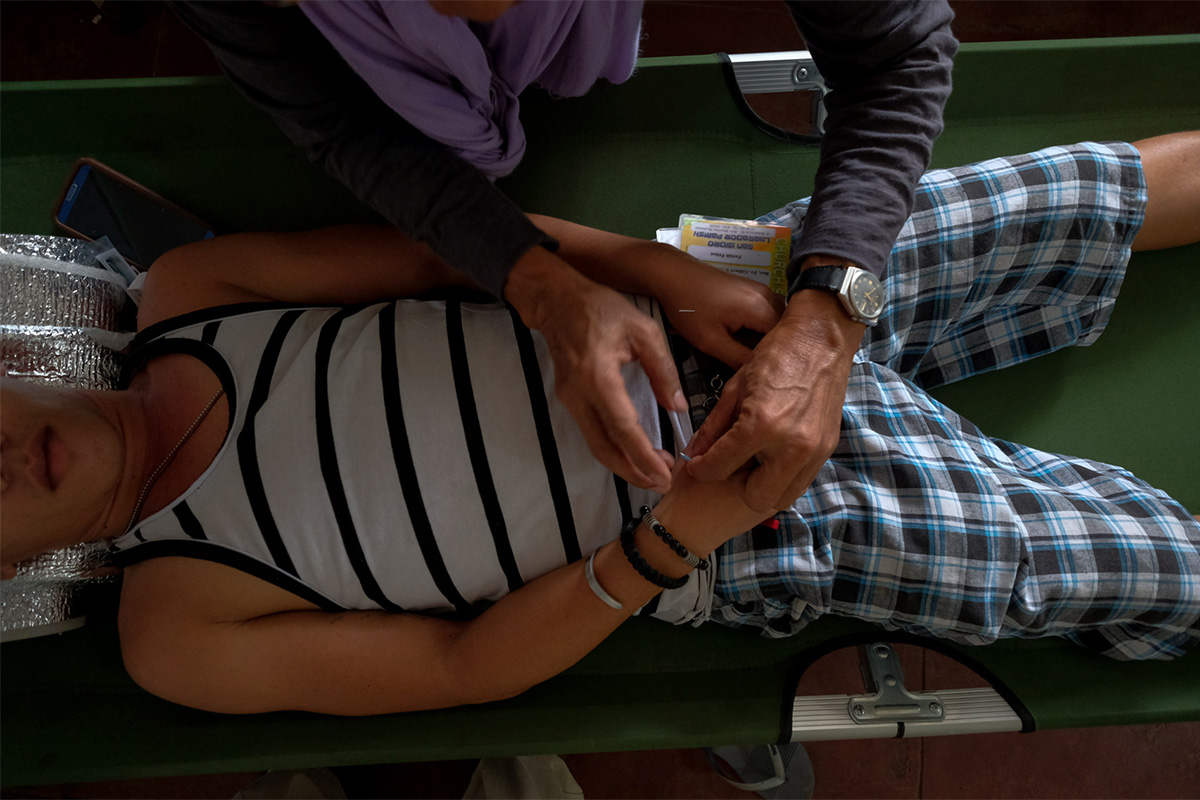
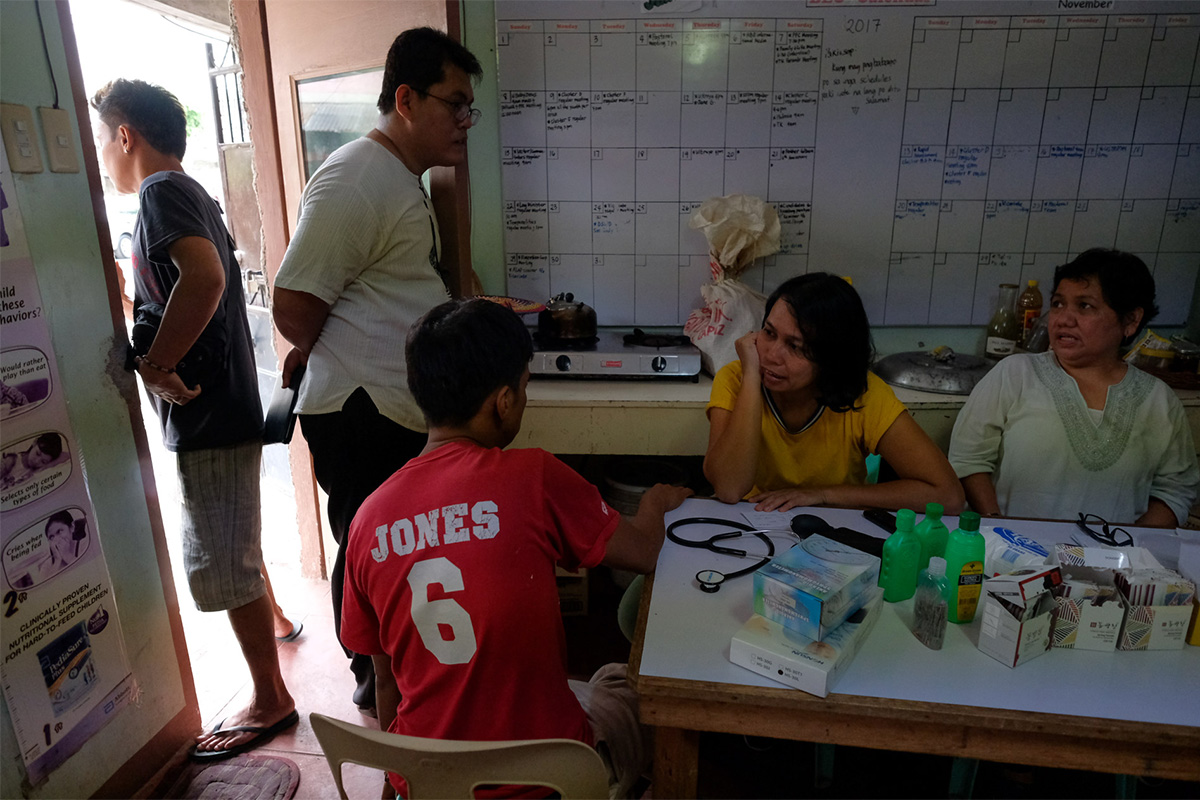
In Barangay Bagong Silangan, the progress in the rehabilitation of former drug dependents is evident.
Gerald Pusing has been undergoing acupuncture therapy regularly for the past months as part of his rehab program for drug addiction. Volunteers said he has gained more than 10 pounds since he joined the program last December and isolated himself from the rest of the group. From his frail and sullen appearance when he joined, Pusing now weighs a healthy 100 pounds and works at the church as a servant.
Sabino explained that while the physical rehabilitation and psycho-social therapy is part of the process to redeem one's self after a bout with drug addiction, the other half of Rise Up's mission is the documentation and legal support for the victims' quest for justice.
In May, the Philippines will have its periodic human rights review (which happens every four years) under the United Nations Human Rights Council (UNHRC). Sabino sees this as a good opportunity to bring up the stories of the victims before an appropriate international body.
It is not easy for photojournalists to see helpless relatives weep in front of the corpses of their loved one, strewn on a cold metal table or the floor of a funeral house. Photojournalists, mostly on night shift, click their cameras and proceed to do their job publishing stories so the rest of the world will know what's happening in the drug war. But, for one photojournalist, shooting his camera means something else.
Ciriaco "Brother Jun" Santiago of the Redemptorists prowls at night, waiting for incidents where he can click his camera and record the victims and families his church will eventually help.
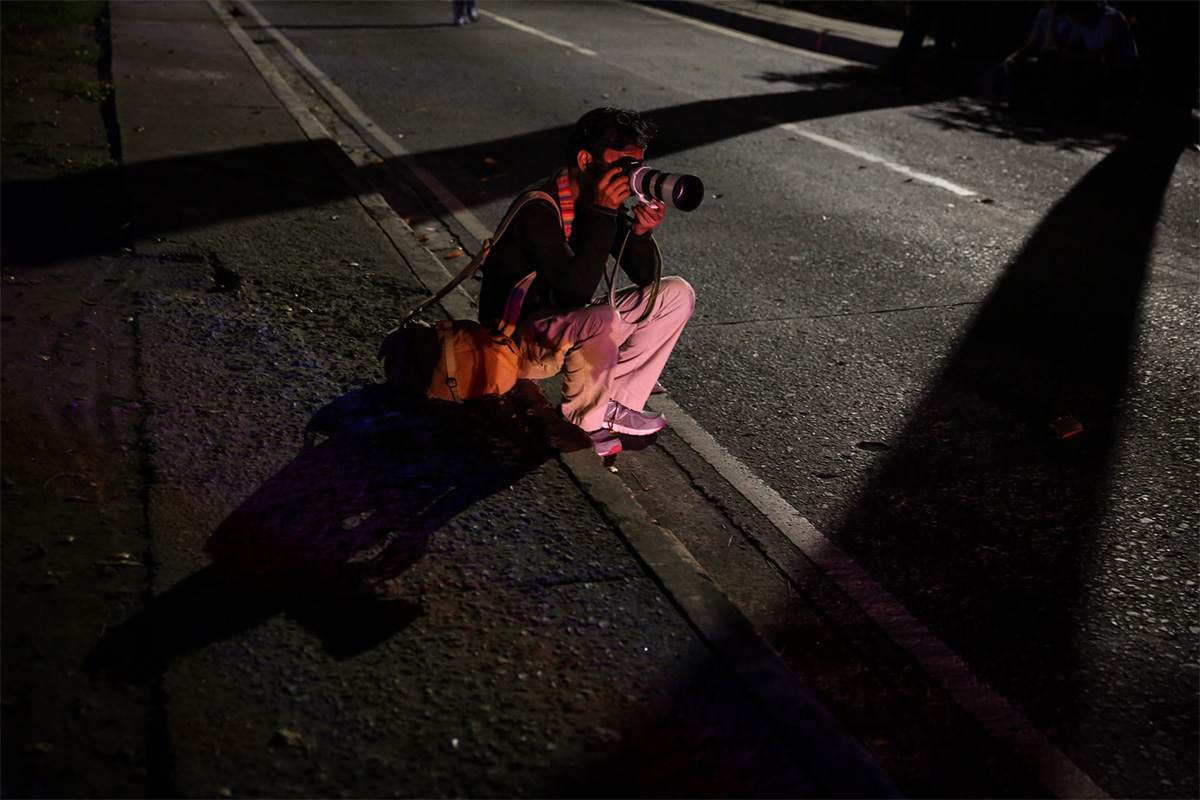
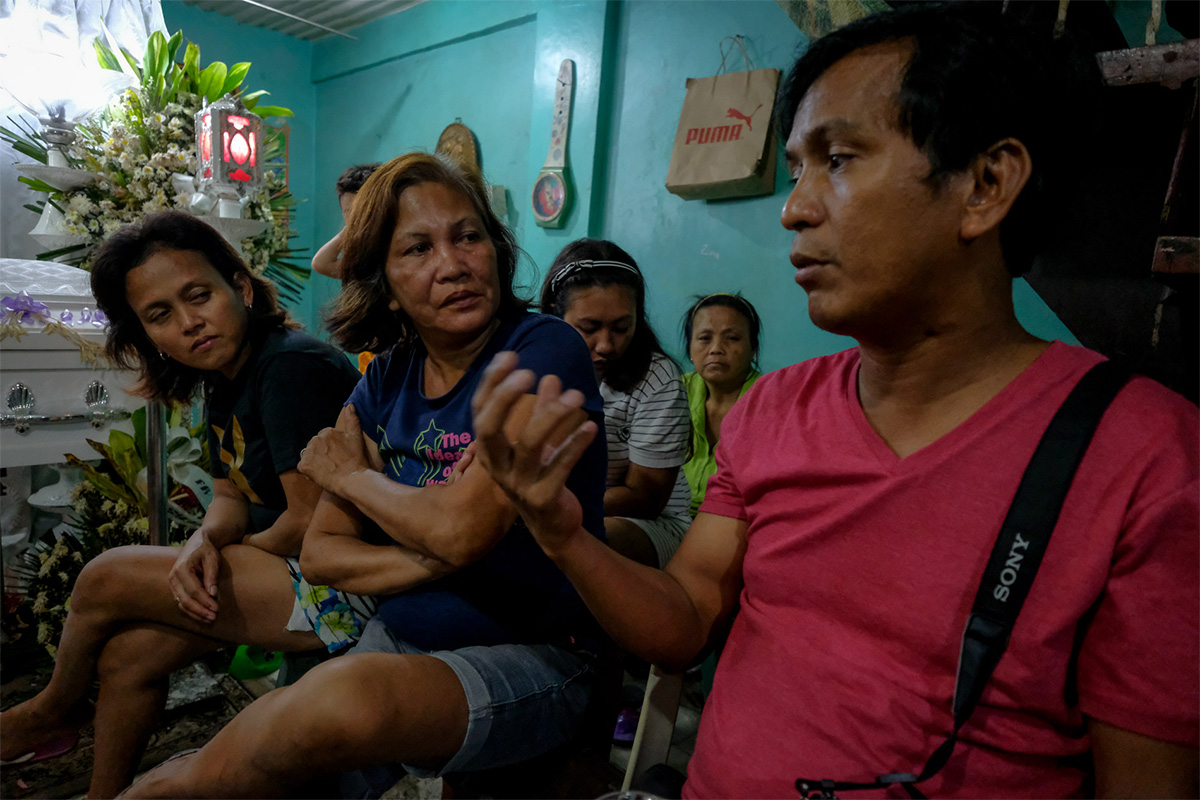

"Siguro mga isang linggo pa lang akong nagsu-shoot. Tuwing kakain kami ng almusal sa simbahan, kinu-kwento ko ‘yung karanasan ko tuwing gabi. ‘Yung mga bahay na ang liliit, ‘yung talagang hindi mukhang bahay, sabi ko ganung kailiit na bahay, ang equation niyan walang kapera-pera, mahihirap. Sabi nila tignan ko raw kung papaano makakatulong," he said.
(Barely a week into the documentation, I would narrate to the priests in the church during breakfast what I experienced the night before. I would tell them the cramped and decrepit living conditions - you would not even consider these as houses - which only means these people are dirt-poor. So, they asked how we can help further.)
Santiago took this as a go-signal, and with the help of Dennis Febre of Baclaran Church's PCSM, he has managed to help more than five dozen families with their funeral expenses. For many of the families, he is God-sent, just like his namesake San Tiago (St. James), who had a mission to spread the word and help the poor.
But the real challenge, according to Santiago, is providing those left behind with a means to redeem themselves. He narrated the tale of a family who had to take out a P20,000 loan to pay for the funeral service, and ended up washing clothes every day for P400 a day for the person who loaned the money. "That is almost like slave labor," Santiago mused.
"Culture naman na talaga na kahit ano pa kasama na tao, ang hinahahanap ng pamilya mabigyan ng disenteng libing ‘yung mga mahal nila sa buhay. Pero mas malalang problema ang kabuhayan nila," Santiago said.
(It is really part of our culture, even for the most hardened sinner, that the family will do all it can to provide a decent burial. But at the end of the day, the more serious problem is the livelihood of those left behind.)
Jorge took a second day of leave from work on January 31. But this time his swollen eyes betrayed the fact that he had been weeping. His bloodied hands, from striking something hard with a blow, were signs of another tale. During the interment, he refused to go near the casket of his father and instead climbed to the top of the six-story stack of tombs to watch the burial of his father down below. Perhaps, out of anger or out of grief, Jorge refused to accept the way his father died.
On that day, Jorge Pepito may have seen snippets of his own life from above the tombs. The wounds on his hands will eventually heal, but only time will tell if he will ever recover from the social injustice he feels.
Editor's note: This special report by ABS-CBN News Digital won the Excellence in Feature Writing at the Society of Publishers in Asia's or SOPA 2018 Awards for Editorial Excellence. The SOPA Awards promote excellence in journalism and best practices in local and regional publishing platforms in the Asia Pacific region.
Read: ABS-CBN drug war report wins prestigious journalism prize